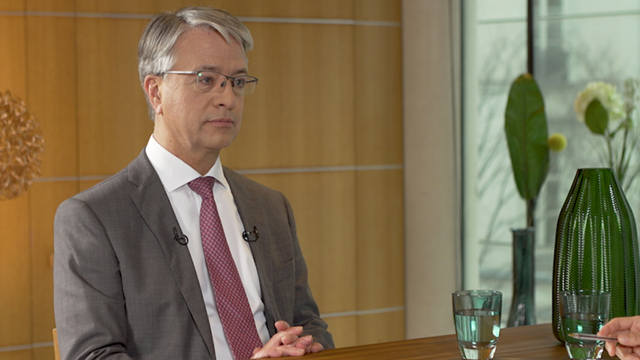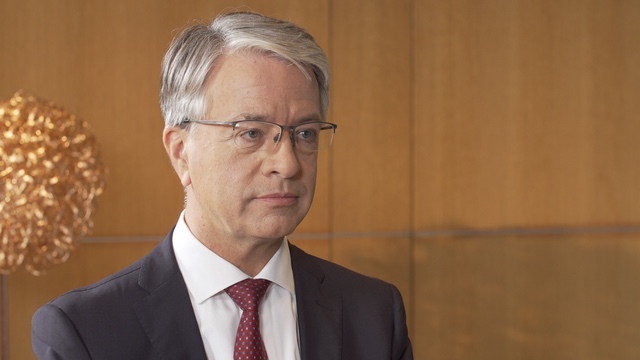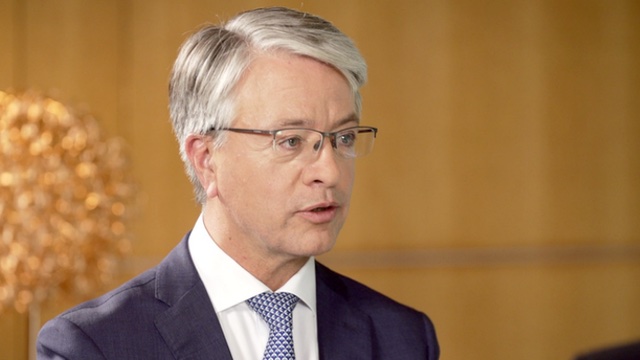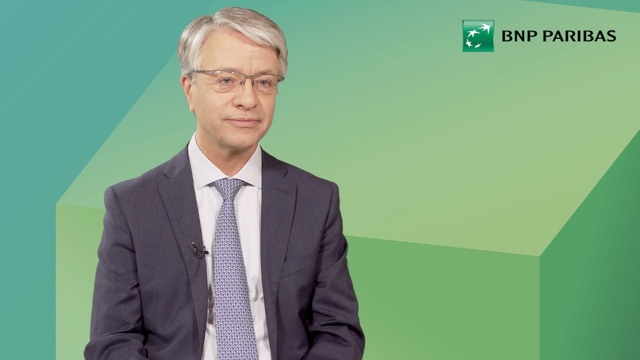EuroBusiness Media (EBM): BNP Paribas, one of Europe’s largest banks reports results for the first quarter of 2013. Jean-Laurent Bonnafé welcome, what are your comments on the Group's performance in the first quarter?
Jean-Laurent Bonnafé: In the first quarter BNP Paribas reported a net income at Group level of 1.6 billion Euros despite a challenging economic context in Europe. I remind you that the first quarter 2012 represented a high comparison base and also included significant one-off elements such as the sale of a stake in Klépierre. This quarter the impact of one-off items was negligible.
> Revenues of the operating divisions were resilient in Retail Banking and Investment Solutions while CIB had a transitional quarter.
> Operating expenses were reduced at Group level, especially in CIB, in Personal Finance and in the Domestic Markets.
> Cost of risk marked a slight increase of 3.5% in the first quarter at Group level, confirming our strong risk management.
Overall, pre-tax income of the operating divisions decreased by 8% as compared with the first quarter 2012, still negatively impacted by the effects of the adaptation plan on CIB.
Deposit growth continued in all the networks with the Domestic Markets and Retail overall showing growth rates above 6% compared to the first quarter last year. In parallel, Corporate
Banking deposits in CIB increased by 14% reaching 57 billion Euros at the end of March.
In the first quarter, BNP Paribas confirmed very strong solvency and liquidity positions. Our fully loaded common equity Tier 1 ratio under Basel 3 stood at a very high 10.0% while we further increased our surplus of stable funding to 79 billion Euros.
Finally, we continued to create value for our shareholders. In fact our book value per share continued to increase steadily reaching close to 62 Euros while the tangible book value per share exceeded 51 Euros.
EuroBusiness Media (EBM): In the current challenging economic environment of the Eurozone, to what extent will productivity gains offset revenue pressure in your Domestic Markets? And how is cost of risk evolving?
Jean-Laurent Bonnafé: Thanks to the initiatives we are currently implementing, we believe that we shall be successful in contrasting revenue pressure through operating efficiency improvements.
Our Domestic Markets proved once again resilient in a difficult European context. As I just mentioned, Deposits increased significantly in all the networks, especially in Italy. On the other hand, demand for credit continued to decrease, which, combined with persisting low level of interest rates, led to slightly softer revenues in the first quarter.
However, we were yet again capable of adapting the cost base to the revenue environment, closing the first quarter with a 1.4% reduction resulting from lower costs in all markets. Hence, Domestic Markets managed to improve its cost/income ratio by 0.3 percent this quarter.
The second part of your question was on cost of risk. The macroeconomic environment, as we have said, remains challenging. However, in the Domestic Markets we must look at each country separately. In Italy, BNL bc showed increasing cost of risk in a context of recession; however, while the year-on-year increase was +35%, the increase versus the previous quarter was limited to +4.6%.
On the other hand, cost of risk remained low in our French Retail banking while the level in our Belgian Retail was particularly low. We expect cost of risk to remain low in these two countries.
EuroBusiness Media (EBM): And what about Personal Finance: how has it fared in the first quarter?
Jean-Laurent Bonnafé: Personal Finance maintained a good level of business activity in the first quarter while continuing to adapt to the new environment.
Joint-venture agreements such as the one with Commerzbank in Germany are developing well.
Savings gathering continues to grow with already 100,000 accounts and 1.2 billion Euros of outstandings.
Product innovation is ongoing as shown by the success of our recently launched online budget management offer for individual clients in France which has already had over 240,000 single visitors since February.
Revenues were 4% lower in the first quarter essentially due to the continuing reduction of mortgage loan stocks as part of the adaptation plan. On the other hand, consumer finance revenues were stable with a good drive in Belgium, Turkey and Central Europe.
Operating expenses marked a 15% reduction benefitting from the adaptation plan effects and leading to an improvement of the operating efficiency.
This, combined with a stable cost of risk, meant that Personal Finance closed the quarter with a pre-tax income of 272 million Euros, confirming its strong profit generation capacity.
EuroBusiness Media (EBM): Regarding International Retail Banking, could you provide some colour on the underlying trends in your Europe-Mediterranean geographies and in BancWest?
Jean-Laurent Bonnafé: Thank you for your question which allows me to complete the picture on our Retail Banking.
Starting with Europe-Mediterranean. The first quarter showed significant volume growth both in terms of deposits which increased by over 15% and loans which were up by 7%. The growth was driven in particular by the strong performance of TEB in Turkey.
This translated into a 16% revenue growth while costs remained well under control despite continuing investments in network expansion in Turkey and in Morocco.
Cost of risk was lower than in the first quarter 2012 but essentially in line with the average of the previous two years.
All in all, a strong performance from Europe-Mediterranean in the first quarter with a pre-tax income contribution of close to 100 million Euros.
In the US, BancWest continued to benefit from good sales and marketing drive in an improving macroeconomic environment. Deposits increased by 4.4% and loans were up 3.9% with a strong performance in terms of corporate loans. We continued to develop our Private Banking where we have already increased managed assets to 5.7 billion dollars.
Revenues were affected by the very low interest rates and fewer securities sales than in the previous year. Expenses were higher due to the investments made in the commercial set up both in Private Banking and for corporate and small business.
But a further improvement in the cost of risk meant that BancWest generated 190 million Euros of pre-tax income, confirming its strong profit generation capacity.
EuroBusiness Media (EBM): In Investment Solutions, the first quarter confirms the rebound of life insurance in France after a difficult 2012. But we're not yet seeing a rebound in revenues in your Wealth and Asset Management. What are your comments on Investment Solutions’ performance in the first quarter? And what can we expect going forward?
Jean-Laurent Bonnafé: Investment Solutions showed a good operating performance in the first quarter with increasing levels of activity especially in Asia.
Asset under management increased to over 900 billion benefitting in particular from the stock markets’ performance and net asset inflows particularly in Wealth Management and in Insurance, including France as you mentioned.
Revenues continued to grow driven by good development in the Insurance business in savings and protection especially in Asia and Latin America. Revenues in Wealth & Asset Management were slightly lower reflecting what you said; however, this was mainly due to lower average assets under management in Investment Partners while Wealth Management performed strongly. Securities Services was affected by the low interest rate environment and by lower transaction volumes.
Costs increased only slightly as higher expenses in the Insurance business due to the growing level of activity were mostly offset by the successful implementation of the adaptation plan in Asset Management.
Overall pre-tax income increased by close to 13% reaching 541 million Euros with a positive contribution of all businesses.
To answer your question regarding what we expect going forward, I remind you that one of the key functions of the businesses of Investment Solutions is to manage our customers’ savings, which makes them very important for BNP Paribas. Moving forward, Investment Solutions will continue to innovate and expand its product offer, strengthening its leadership positions in Europe and continuing to develop relevant businesses in fast growing areas such as Asia-Pacific, Latin America and the Gulf countries.
EuroBusiness Media (EBM): In Corporate & Investment Banking, your Advisory and Capital Markets revenues are down year on year, as is the case with most of your peers. What is driving this in your opinion: pricing, volumes or demand from clients? How do you see this evolving going forward?
Jean-Laurent Bonnafé: In the first quarter the level of activity in Capital Markets was particularly irregular as tensions in Europe resurfaced on more than one occasion. This affected our Advisory & Capital Markets revenues which were lower than in the first quarter 2012 which - I remind you - had benefitted from the LTRO market euphoria in Europe and hence represents a high comparison base. However, we continued to grow our revenues in Asia.
In Fixed Income we saw a good performance in Forex but sluggish activity on Rates and Credit. We retained a strong global positioning in bond issues where we confirmed our number 8 ranking for “all international bonds” and top spot for “all corporate bonds in Euro”.
On the Equities & Advisory side, the combination of low transaction volumes and limited investor demand weighed on revenues. However, we saw a pick-up in structured products activity especially in Europe and in Asia. In “Equity linked” we kept a top positioning: number 2 in Europe and top 10 worldwide.
Hence, to answer your question I would say that the reason for lower revenues is due to the combination of a high comparison base last year, limited client demand reflected in sluggish volumes.
Going forward, given our leading positions in these activities, we think that we’ll benefit from the evolution towards Originate to Distribute that is developing progressively in Europe. Furthermore, in view of ever increasing regulatory constraints, we expect some rationalization of market participants. In a nutshell, we think that we’re very well placed to benefit from these market trends.
EuroBusiness Media (EBM): Still in Corporate & Investment Banking, the revenues of your corporate banking activities were lower, due to deleveraging last year. What are your views on the evolution of your corporate banking revenues?
Jean-Laurent Bonnafé: In the first quarter Corporate Banking revenues were lower, as you rightly said, due to our deleveraging plan. In addition, they were affected by low demand in an unfavourable European context. Loan outstandings at the end of the quarter were slightly lower than at year-end 2012 but have bounced back from a lower level during the quarter. This was due to the progressive re-launch of the origination activity which has allowed Corporate Banking to start rebuilding its deal pipeline towards the end of the quarter. At the same time we strengthened our number 1 position in syndicated loans in Europe.
Alongside the lending activity, we also continued to consolidate the development of our deposit gathering in conjunction with our Cash Management offer where we signed some significant pan-European mandates during the quarter. Moreover we continued to grow our deposit base which increased to 57 billion Euros with a strong contribution from US dollar deposits.
Having completed our deleveraging in 2012, as I mentioned before, the focus this year is on progressively re-launching the origination activity while continuing to improve the self-funding capacity of this business line.
EuroBusiness Media (EBM): Last quarter you announced your cost optimization plan 'Simple & Efficient'. Can you provide us with an update on where you stand?
Jean-Laurent Bonnafé: I remind you that our objective through “Simple & Efficient” is to simplify the Group’s way of functioning and improve operating efficiency, leading to recurrent annual savings of 2 billion Euros from 2015 alongside one-off transformation costs totaling 1.5 billion Euros over 3 years.
We indicated that this plan would involve all businesses and geographies. To be more precise some 55% of the savings should come from Retail Banking with 35% in the Domestic Markets and 20% in Personal Finance and International Retail Banking. The savings contributions from CIB should be at around 30% with Investment Solutions contributing 15%.
In the first quarter we already booked 155 million Euros of transformation costs. Numerous projects are being swiftly launched as illustrated by certain aspects of the “Bank for the future” plan announced in Belgium.
In conclusion, the implementation of “Simple & Efficient” has got off to a promising start and we are cruising ahead of schedule.
EuroBusiness Media (EBM): Jean-Laurent Bonnafé, CEO of BNP Paribas, thank you very much!
Jean-Laurent Bonnafé: You’re welcome! Before we conclude, I remind everyone to save the date of 16 May when we shall be officially launching our new Digital Bank in four European markets. See you then!






